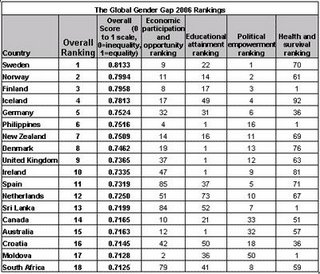
The Philippines is ranked 6th in the World Economic Forum’s gender gap index.
The report measures the size of the gender gap in four critical areas of inequality between men and women and the Philippines ranking puts it as the highest ranked Asian country.
Firstly there's the economic participation and opportunity category, which involves outcomes on salaries, participation levels and access to high-skilled employment. In this category, the Philippines is ranked 4th....... not bad.
In the second category, which is the education attainment category which involves outcomes and access to basic and higher level education, the Philippines ranked 1st! Hello...
In the political empowerment category, I am sure we ranked unfairly...at 16th. I think we should also be number 1. We have two women presidents, hundreds of Governors, Congresswomen, Mayors etc.
In the health and survival category, this is one category which I do not understand why we placed number 1.
The report covers all European Union countries, 20 from Latin America and the Caribbean, over 20 from sub-Saharan Africa and 10 from the Arab world. Together the 115 countries cover over 90% of the world population according to the report.
Ricardo Hausman, director of the Centre for International Development at Harvard University says that the index assess countries on how well they are dividing their resources and opportunities among their male and female populations, regardless of the overall levels of these resources and opportunities.
“Thus the index does not penalise those countries that have low levels of education overall, but rather those where the distribution of education is uneven between women and men,” he said. The repot also provides evidence in the link between the gender gap and the economic performance of countries.
“Our work shows a strong correlation between GDP per capita and the gender gap scores. While this does not imply casualty, the possible theoretical underpinnings of this link are quite simple. Countries that do no fully capitalise effectively on one half of their human resources run the risk of undermining their competitive potential,” Laura Tyson, Dean of the London Business School said. “We hope to highlight the economic incentive behind empowering women in addition to promoting equality as a basic human right,” Tyson said.
Source: http://www.moneyweb.co.za/economy/economic_trends/450333.htm
The report measures the size of the gender gap in four critical areas of inequality between men and women and the Philippines ranking puts it as the highest ranked Asian country.
Firstly there's the economic participation and opportunity category, which involves outcomes on salaries, participation levels and access to high-skilled employment. In this category, the Philippines is ranked 4th....... not bad.
In the second category, which is the education attainment category which involves outcomes and access to basic and higher level education, the Philippines ranked 1st! Hello...
In the political empowerment category, I am sure we ranked unfairly...at 16th. I think we should also be number 1. We have two women presidents, hundreds of Governors, Congresswomen, Mayors etc.
In the health and survival category, this is one category which I do not understand why we placed number 1.
The report covers all European Union countries, 20 from Latin America and the Caribbean, over 20 from sub-Saharan Africa and 10 from the Arab world. Together the 115 countries cover over 90% of the world population according to the report.
Ricardo Hausman, director of the Centre for International Development at Harvard University says that the index assess countries on how well they are dividing their resources and opportunities among their male and female populations, regardless of the overall levels of these resources and opportunities.
“Thus the index does not penalise those countries that have low levels of education overall, but rather those where the distribution of education is uneven between women and men,” he said. The repot also provides evidence in the link between the gender gap and the economic performance of countries.
“Our work shows a strong correlation between GDP per capita and the gender gap scores. While this does not imply casualty, the possible theoretical underpinnings of this link are quite simple. Countries that do no fully capitalise effectively on one half of their human resources run the risk of undermining their competitive potential,” Laura Tyson, Dean of the London Business School said. “We hope to highlight the economic incentive behind empowering women in addition to promoting equality as a basic human right,” Tyson said.
Source: http://www.moneyweb.co.za/economy/economic_trends/450333.htm
